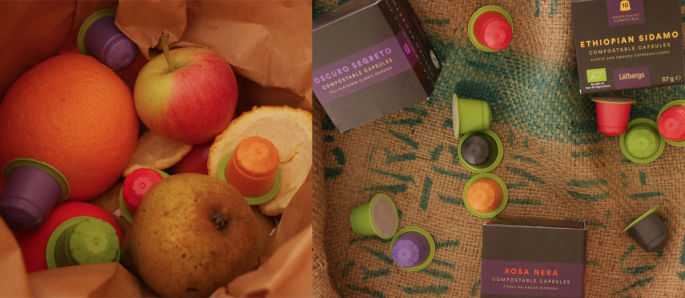Consumers in Sweden will in a few days meet a new product on the shop shelves: Löfbergs’s new plant-based coffee capsule that can be used in the Nespresso system and thrown away together with food waste. And that naturally contains really good, selected certified coffee.
Coffee capsules have, with good reason, been an example of the unsustainable and wasteful consumption of provisions and packaging that today is a part of our everyday life.
The coffee capsules have had a strong growth in the last few years and stands for 4.5 % of the total coffee market in Sweden 2014 and for a whooping 30 % in Europe.
The capsules are produced almost exclusively of non-renewable materials like plastic and/or aluminium, often wrapped up in even more material to preserve the flavours.
The debate about the existence of coffee capsules sparked off again last spring as the German city of Hamburg prohibited coffee capsules – and other disposable materials – from the city’s council buildings.
We at Löfbergs welcome this debate, but we do not believe that consumers will stop drinking capsule coffee and we do not think they should have to either.
Even if the amount of packaging material could be questioned, there are many advantages with capsules.
You only brew as much coffee as you need, which reduces waste, and the machine can be turned off straight away when it has been used compared to a coffee maker that often is on for an unnecessary amount of time.
Plant-based coffee capsules – we want our competitors to follow
The selection of capsules is enormous today, and new variations enter the market all the time. But with the existing climate situation and the world’s new goals of Agenda 2030, a switch-over from fossil based to renewable material is required quickly.
In 2050, the ratio of plastics to fish in the ocean is estimated to be 1:1, and is already 1:5 according to a report from Ellen MacArthur Foundation. **
If we have the possibility to offer the consumers really good certified coffee in a capsule made of plant-based material (PLA) instead of fossil based plastics or aluminium and at the same time push on the development in the business, we should of course do it.
By having the courage to develop and launch this type of products, we want to pave the way for a broader commercialisation.
Someone has to be first, and now we hope that more will follow. I therefore encourage our colleagues in the business to switch over to renewable material for coffee capsules.
If we do so we can soon see a revolution within the area and a quick conversion that in the long run benefits us all. It is our obligation as players in the coffee business to push on for a more sustainable consumption of coffee.
No matter if it is about new materials for our packaging or how we work to make sure that the farmers that cultivate the coffee we purchase can earn their living and live a good life, so that there is really good coffee available tomorrow as well.
Our plant based capsules are sold in Sweden under the Löfbergs brand but also in Denmark under the Peter Larsen brand and in UK under the Percol brand.
Have a nice coffee moment,
Lars Appelqvist, CEO, Löfbergs
*Nespresso® is a third party registered trademark and has no association with Löfbergs.
** Ellen MacArthur Foundation, The New Plastics Economy, page 28 E OF PLASTICS


















